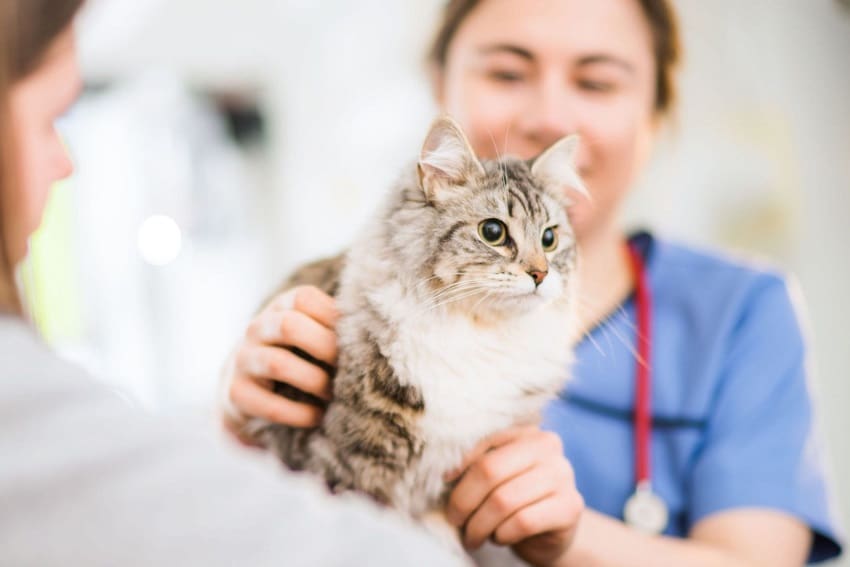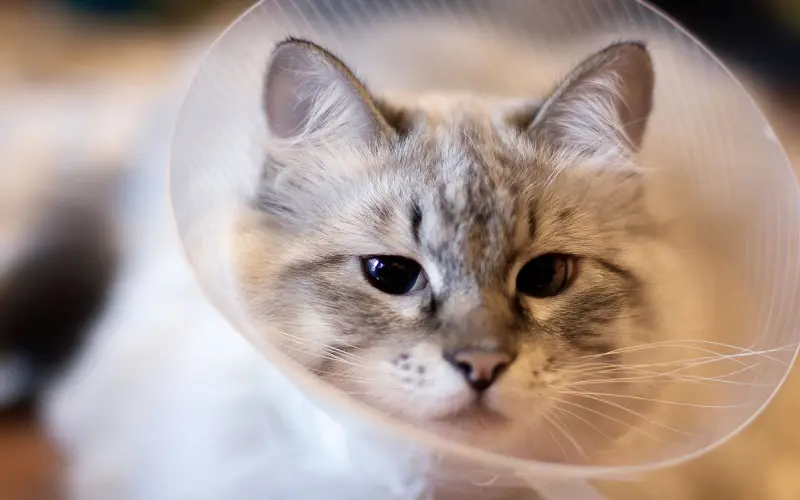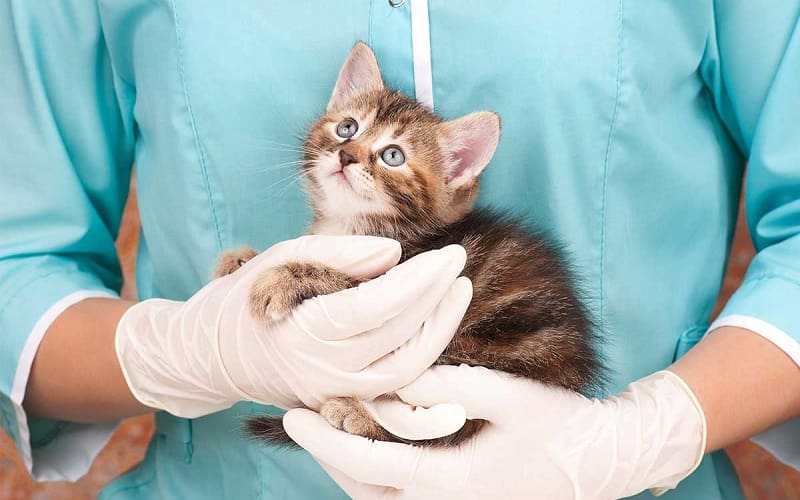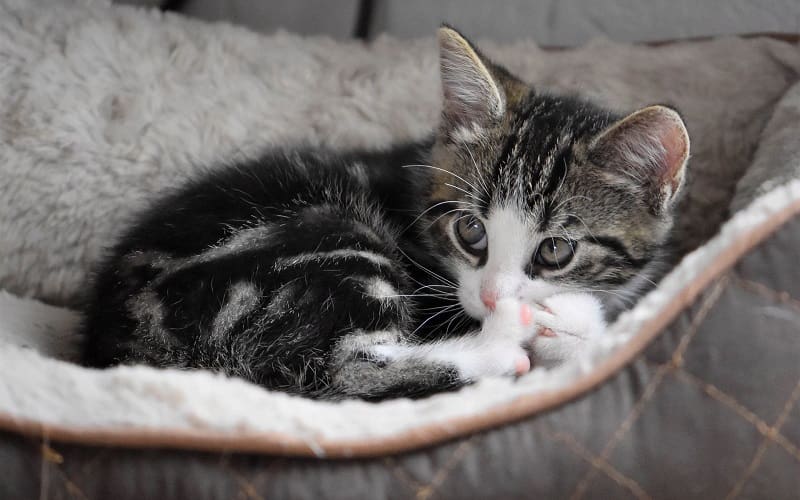Last Updated: 2 months ago
Spaying a cat is essential for every pet parent. It prevents her from roaming since she won’t try to escape to look for a mate. Plus, it prevents local overpopulation.
Spaying also helps reduce your pet’s chance of becoming seriously sick. For instance, cats spayed before six months old are 90% less likely to develop cancer later in life.
Your cat can have a long and happy life with you. The procedure can even prevent many feline behavioral issues. These include aggression and excessive yowling.
You’ll want to know when to spay your cat. Also, if there are any potential side effects before your cat’s surgery date.
After reading, you’ll be confident that you know everything about spaying cats. So, let’s dive in!
When to spay a cat

You should spay most cats between four and six months old.
But the timing can depend on several factors, so speaking with your vet is essential. They’ll let you know the earliest they can perform the procedure, since every cat is different.
It’s important to spay your cat when she’s young. She’ll heal quickly and have less risk of disease later in her life. The more heat cycles she goes through, the more likely she is to have health complications.
Some cat breeds go into heat at four months old, and others don’t until they reach one year old. Larger cat breeds take longer to enter this stage than smaller breeds.
Of course, you can always spay an older cat, as long as she’s healthy. Doing so can still provide her with health benefits and prevent overpopulation problems.
Your older cat will take longer to recover, but the risk of complications is still low.
Benefits of spaying a cat
Your cat receives many health benefits after the procedure. There’s a less than 0.5% chance she will get breast cancer as an adult if she is spayed before the first heat cycle.
That’s one of the main reasons why spaying a cat so young is essential. It also drastically reduces your cat’s odds of getting uterine cancer.
Also, it prevents some reproductive diseases and complications, like uterine infections. Many of these illnesses are fatal, so prevention through spaying is crucial.
It also comes with several behavioral benefits. Unspayed cats are likely to wander away from home and fight with other animals. So, you’re keeping them out of danger when you spay them.
Lastly, spaying a cat will prevent her from yowling loudly inside since she won’t be on the prowl for a mate. Some cats can be very loud, so it’s worth it.
Side effects of spaying a female cat

Most of the effects of spaying a cat are positive. Yet, infection is possible if parts of the uterus remain in the cat, although this is rare.
You’ll want to know what to look for to avoid infection-related problems with your cat. It’s more likely that your cat irritates the incision site by grooming.
Your pet may get an infection from licking the wounds, so keep an eye on her. She may need to wear a cone to stop herself from agitating the site during recovery.
Here are some of the most common signs of infection after a spaying procedure:
- The incision looks irritated, swollen, and red.
- The incision site drains fluids for more than 24 hours.
- The wound reopens.
- There is a green discharge around the site.
- There’s a foul smell around the site.
Make sure to contact your vet immediately if you suspect that your cat has an infected spaying wound.
How to tell if a cat is spayed
If you’ve taken in a cat, you’ll want to know if she’s spayed. You can tell by checking her tummy for a scar.
This scar is a thin line in the middle of her lower stomach. It can be hard to find because most vets don’t leave behind noticeable marks today.
You’ll also need to touch the cat’s belly to search through her fur, which could get you scratched.
Some vets will also leave a spay tattoo on one of the cat’s ears or stomach near the incision. It’s usually a green line, letter, or number.
If the cat has a single notch in one of her ears, she could also be spayed. Some catch-and-release programs will tip a cat’s left ear after the surgery. Volunteers don’t trap her again that way.
Still, your best option is to bring her to a vet and ask them.
Spaying a cat procedure: What to expect

The vet will have instructions for you to follow before the procedure. They’ll have your cat fast the night before to prevent vomiting during surgery.
Next, you’ll drop your cat off at the practice. The vet will let you know when to pick up your pet. Make sure to bring a carrier for her.
This procedure is straightforward, so you’ll likely pick her up that same day. The vet will watch her after the surgery for a few hours to ensure she’s safe to take home.
All cats react differently to anesthesia, so some may take longer to wake up than others. Your vet will also cover any medications you take with you before you leave. These can include antibiotics and pain management pills.
After bringing her home, your cat will only want to rest. She’ll be less active and sleep more for a few days. It’s also normal for her to not have much of an appetite.
Post-spay care for cats

Post-spay care is crucial to keeping your cat healthy. It’s best to set up an empty room early, somewhere your cat can be away from other pets and children for a few days.
Here’s what you’ll need to do for post-spay care:
- Put a cone on her.
- Keep your cat indoors.
- Provide her with a safe, quiet, and comfortable resting space.
- Give her fresh, clean bedding.
- Leave her food and water nearby.
- Clean her litter box frequently.
- Avoid bathing your cat for two weeks.
- Give your cat her medication following the vet’s instructions.
- Make sure your home’s temperature is comfortable for cats.
- Check on your cat’s incision often for signs of infection.
- Contact the vet right away if there are signs of complications.
After spaying a cat, she’ll need between 10 and 14 days to recover. Keep her inside for at least a week to prevent issues.
FAQ
Are there any potential risks to spaying a cat?
There are few risks to spaying your cat since it’s a simple procedure. Although some side effects can occur after the surgery, uterine or incision site infections are possible but very uncommon. Your cat might lick the wound too much.
So, you’ll need to put an Elizabethan collar on her while she heals. Cats who get the surgery live longer than those who don’t, since they have fewer health risks. So the pros outweigh the cons when spaying a cat. You won’t want to skip it, even if you have an indoor-only cat.
How long does a spay surgery take for a cat?
Spay surgery doesn’t take long for cats, usually between fifteen and twenty minutes. Several factors can impact the time it takes, including your pet’s age, size, and whether she’s already in heat. Most of the time spent waiting until discharge is waiting for the cat to wake up from the anesthesia.
The vet will watch her to see how she reacts and if there are complications. This process can take a few hours, so the vet should call you when your cat’s ready to go home. You won’t need to wait at the vet’s office. They will require you to have a cat carrier with you before leaving.
When should you spay or neuter your cat?
You should spay or neuter your cat when they’re between five and six months old. At this age, they should be large enough for the surgery. Still, every kitten is different, so you’ll want to discuss this with your vet. The cat’s breed can impact when spaying is necessary.
The vet will schedule an appointment before the surgery. During this check-up, the vet ensures your cat’s vaccinations are up-to-date. They also check how she’ll react to the anesthetic used during the spaying procedure.
What is the cost of spaying a cat?
Generally, you can expect to pay between $300 and $500 for spaying your cat at most vets. Spays completed through rescue or adoption shelters usually cost less, around $100. Where you live, as well as the age and size of your cat, can impact the total price of surgery.
You can ask your local vet practice about low-cost options for spaying. Many vets will create a budget with you or offer financial aid through programs. So, even though it’s expensive, your vet should be willing to work with you to ensure your cat can get the surgery.
Conclusion
In short, there are many benefits to spaying a cat. She’ll have less risk of disease, won’t wander as far, and will have fewer behavioral issues.
Spaying her before she’s older than six months will offer more benefits than if you wait. So, you must talk with your vet about the procedure as soon as possible. Still, you can spay an older cat with great results.
Spaying is quick, and there aren’t many risks for complications. Follow all post-surgery care instructions from your vet for an easy recovery.
Now you know everything about spaying your feline friend!

Dr. Linda Simon MVB MRCVS is a locum veterinary surgeon who has worked in London for the past 8 years. She graduated top of her class in small animal medicine from UCD, Dublin. She is currently a member of the Royal College of Veterinary Surgeons. Linda is the resident vet for Woman magazine and a frequent contributor to People’s Friend Magazine, the Dogzone website, Vet Help Direct and Wag! Linda also writes content for the CVS veterinary group, Vetwriter and a number of other establishments.
